
Practice Makes Perfect: 7 Dropshipping Returns Mistakes To Watch Out For
Handling dropshipping returns can be challenging. In this article, we’ll discuss the most common return mistakes and how to deal with them!
Shipping, Tracking & Notifications
Boost customer experience and reduce support tickets
Realtime order and shipment tracking
Proactive order and shipping notifications
AI-Enhanced Discounted Labels
Predictive pre-purchase estimated delivery dates
Self-Serivce branded order tracking
Effortless experience delivered
Identify and Resolve Order Issues
Realtime order and shipment tracking
Make returns profitable and delight customers
Flexibility to define any return destinations & conditions
Simplify returns for your customers and team
Incentivize exchanges over returns
Returns management made easy for your team
Returns management made easy for your team
Easy claims and smart upsells
Understand why your customers are returning
In-Store & Curbside Pickup
Unify the online and the in-store experience
Hassle-free pickup experience for customers
In-Store dashboard to keep operations streamlined
In-Store and Online orders unified
Drive foot-traffic to your stores
Shipping, Tracking & Notifications
Boost customer experience and reduce support tickets
Realtime order and shipment tracking
Proactive order and shipping notifications
AI-Enhanced Discounted Labels
Predictive pre-purchase estimated delivery dates
Self-Serivce branded order tracking
Effortless experience delivered
Identify and Resolve Order Issues
Realtime order and shipment tracking
Make returns profitable and delight customers
Flexibility to define any return destinations & conditions
Simplify returns for your customers and team
Incentivize exchanges over returns
Returns management made easy for your team
Returns management made easy for your team
Understand why your customers are returning
In-Store & Curbside Pickup
Unify the online and the in-store experience
Hassle-free pickup experience for customers
In-Store Dashboard to keep operations streamlined
In-Store and Online orders unified
Drive foot-traffic to your stores
Boost customer experience and reduce support tickets
Realtime order and shipment tracking
Proactive order and shipping notifications
AI-Enhanced Discounted Labels
Predictive pre-purchase estimated delivery dates
Self-Serivce branded order tracking
Effortless experience delivered
Make returns profitable and delight customers
Flexibility to define any return destinations & conditions
Simplify returns for your customers and team
Incentivize exchanges over returns
Returns management made easy for your team
Equip your team for precise return checks.
Easy claims and smart upsells
Understand why your customers are returning
Unify the online and the in-store experience
Hassle-free pickup experience for customers
In-Store Dashboard to keep operations streamlined
In-Store and Online orders unified
Drive foot-traffic to your stores
Find the answer to all your questions
Take a step by step trip through our functionality to see how we can improve your ecommerce processes.
Explore the most comon questions about WeSupply
Calculate the ROI that WeSupply can bring you
Read actionable articles on how to optimize your post-purchase experience and decrease support tickets
Get inspired by stories of how our customers implemented an effortless post-purchase experience
Wondering if WeSupply is a good fit for you? Read through our use cases to see how we can help you increase conversion & improve CX!
A Deep Dive into Top Companies' Order Tracking & Returns Strategy
Find the answer to all your questions
Explore the most comon questions about WeSupply
Calculate the ROI that WeSupply can bring you
Request a no strings attached review of your current shopping experience and missed conversion opportunities
Take a step by step trip through our functionality to see how we can improve your ecommerce processes.
Read actionable articles on how to optimize your post-purchase experience and decrease support tickets
Get inspired by stories of how our customers implemented an effortless post-purchase experience
A Deep Dive into Top Companies' Order Tracking & Returns Strategy
Wondering if WeSupply is a good fit for you? Read through our use cases to see how we can help you increase conversion & improve CX!
Don’t let international eCommerce challenges stop you from growing. Here you’ll find 5 tips for improving the international returns process.

Returning an item bought from a foreign eCommerce site can be confusing and frustrating. Different rules and regulations in each country make the process seem impossible. Many online shoppers know the frustration of ordering something from a foreign country, only to find out that they can’t return it once they’ve received it. What are the best ways to overcome international returns barriers?
With a little organization and some tips, returning an international purchase can be a breeze. In this blog post, we’ll explore some tips for making international returns as smooth as possible for your customers. By following these tips, you’ll be able to make your customers happy and keep them coming back for more!
Did you know that in Europe, 63.4% of online shoppers buy from foreign retailers? To put this into perspective, more than half of European online shoppers get their products from retailers outside Europe, including the US!
If your eCommerce business ships from the US, then you know how challenging returns can be: longer wait times, extra costs and fees, different regulations that vary by country, among others. It comes as no surprise that international returns are notoriously difficult to keep track of because of the fragmented carrier and courier network. In fact, there is little way of telling where the packages are coming from, in what condition they will arrive, or even why they are being returned in the first place.
Besides, there are a few significant reasons why people return their purchased products, such as incorrect items received, inaccurate color or size, defective items, and last but not least, products returned due to bracketing.
What even is bracketing? It is the practice of buying a single item in multiple sizes or colors in order to determine the version that fits best, then returning back to the retailer the remaining items. Considering that most eCommerce websites do not cover shipping fees on the behalf of their customers, especially for international sales, this acts as an incentive to buy an item in various sizes and colors and deal with the returns later. In fact, 40% of consumers surveyed said they bracketed their purchases at least occasionally, and the numbers are only going up.

Although this is not entirely bad news, you need to be aware of this practice and how you can improve your international returns and work on your ecomemrce return policy so that you don’t end up losing too many precious resources like time, energy, and, of course, money.
While cross-border eCommerce is a key element for online retailers looking to expand their business and increase their number of sales, it comes with both perks and disadvantages. More specifically, one of the main reasons small to medium-sized companies will shy away from selling their products internationally is the fear of returns.
Considering all custom limitations and fees, global returns and refunds might seem a real challenge for eCommerce businesses. However, this area can be easily managed as long as you’re using reliable returns management tools that work for your online business, and that preferably enable you to take various actions based on each carrier, courier service, location, and even product.
Once you have these aspects covered, you can go as far as transforming international returns into future business opportunities. Don’t let something as simple as returns hold you from selling internationally and getting your products in new markets!
Moreover, the current supply chain strain is causing an increase in shipping costs. In fact, the average cost to handle a returned item is up 59% from 2020 (source). The return costs are often covered by retailers, putting additional pressure on their businesses. Offering free return shipping is a great way to increase customer retention and improve the overall customer experience, but it can also take a toll on your online store if not handled properly and as cost-effectively as possible.
Increasingly tech-savvy and hurried consumers are naturally demanding returns to be processed at a higher speed, with more flexibility and convenience. In order to meet their expectations, your returns service should be just as effective as the delivery. If you’re failing to rise to their standards, you’ll have to deal with cart abandonment, reduced customer lifetime value, or missed opportunities.
Just like any other returns, international ones can be managed effectively with the right tools, without taking up too much of your time and energy or adding too much pressure on your customer support team. Although they might seem complicated, in fact, it’s only adding a couple of steps more to the entire returns process you might already have in place.
When shipping your product to your customer, you’re working with carriers that transport packages in considerable amounts cross-border and then with local couriers that bring the order right to your customer’s door. In reverse logistics, it’s pretty much the same, just the other way around. Your customer needs to get in touch with a local courier and then they’ll send the package further until it reaches you.
But in order to make the most out of international returns, we’ve got some tips for you that are guaranteed to help you improve the post-purchase experience for your customers while taking a load off your customer care representatives:
Your international return policy should be simple and clear. Include all the essential details, like what you can and cannot return (e.g., perishable items or personal hygiene products), as well as how long it takes for international returns, and have a well-established return window for each category of items.
Most importantly, take into consideration different return rules for all countries you’re shipping to! Customs regulations and fees may vary greatly depending on the country, and this will surely affect the duration and costs of your returns process. You might even want to consider setting different return rules for items that are more expensive to return than the actual cost of the product. If your customers received a wrong type of phone case that costs $15 but the entire returns process would cost you the same amount and additional refund or exchange costs, it’s better to allow your customers to keep the item instead.
Last but definitely not least, i’s important to allow enough time for international returns, especially if there are any upcoming holidays in either country. Therefore, adjust the timeframe for international returns accordingly and provide proactive notifications all the way through to ease your customer’s mind.
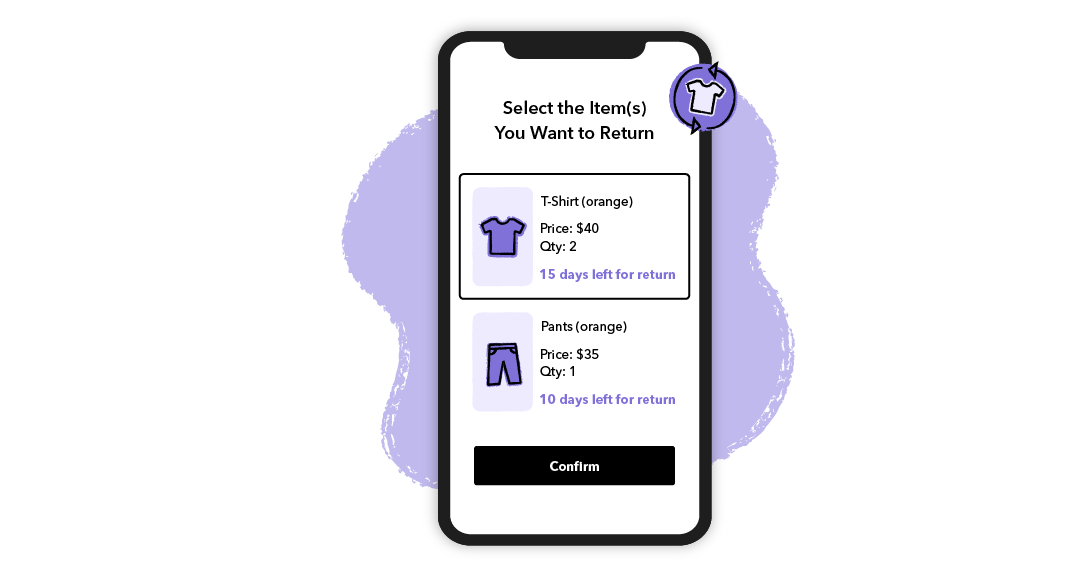
What should a return policy look like? Check out our Free Policy Template here!
To effectively optimize your return process, you need to decide whether or not you’ll be turning to their-party logistics partners. If you do so, your chosen logistics partners will handle most of your returns on their end in the destination country and, by the end of the month, or another pre-determined period (e.g., two weeks, 90 days, etc.), they will send you back all the items at once to save a lot of money in terms of transportation costs.
Working with a third-party company may even enable you to resell some of the returned items right away, which also helps you cut down on transportation costs. In this category, we have solutions such as Global-e that enable eCommerce business owners like yourself to deal with international returns as productively as possible.
If you’re not planning on turning to third-party logistics partners, there still are cost-effective ways to deal with returns while increasing customer satisfaction. For instance, you might want to consider enabling your customers to return a product with an international carrier (e.g., FedEx, DHL). They will have to go directly to your partner international logistics service provider(s) in order to ship the item back to your warehouse.
Another method that is more effective, especially in terms of customer experience, would be to return items via a centralized system, like WeSupply. Your customers can send the item to the origin country via a local courier, which will then ship it through an international carrier. This option gives both you and your customers visibility through WeSupply and a user-friendly interface that makes the entire process more pleasant.
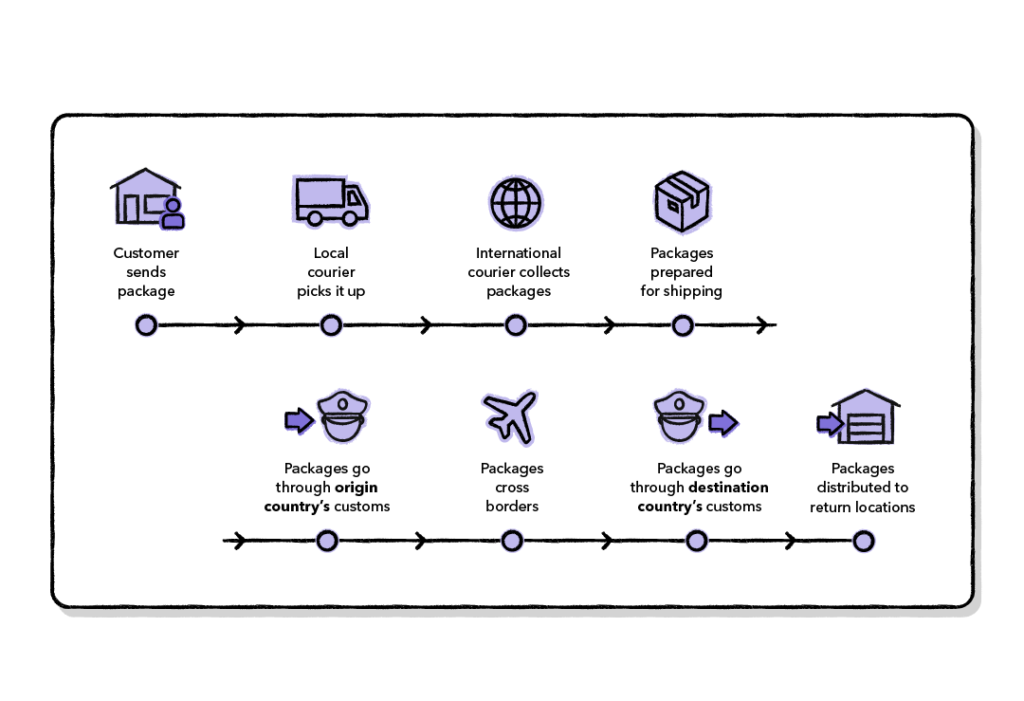
If might have brick-and-mortar stores where customers can bring their returns in-person and receive their money back on spot, or you might provide a designated drop-off point for your local returns, but that doesn’t really work for international returns.
You need a different approach to return flexibility, and for that, you might consider working on a special return policy for international returns, and offering multiple refund options, from the original method of payment to online store credit coupons: whatever fits your business model best!
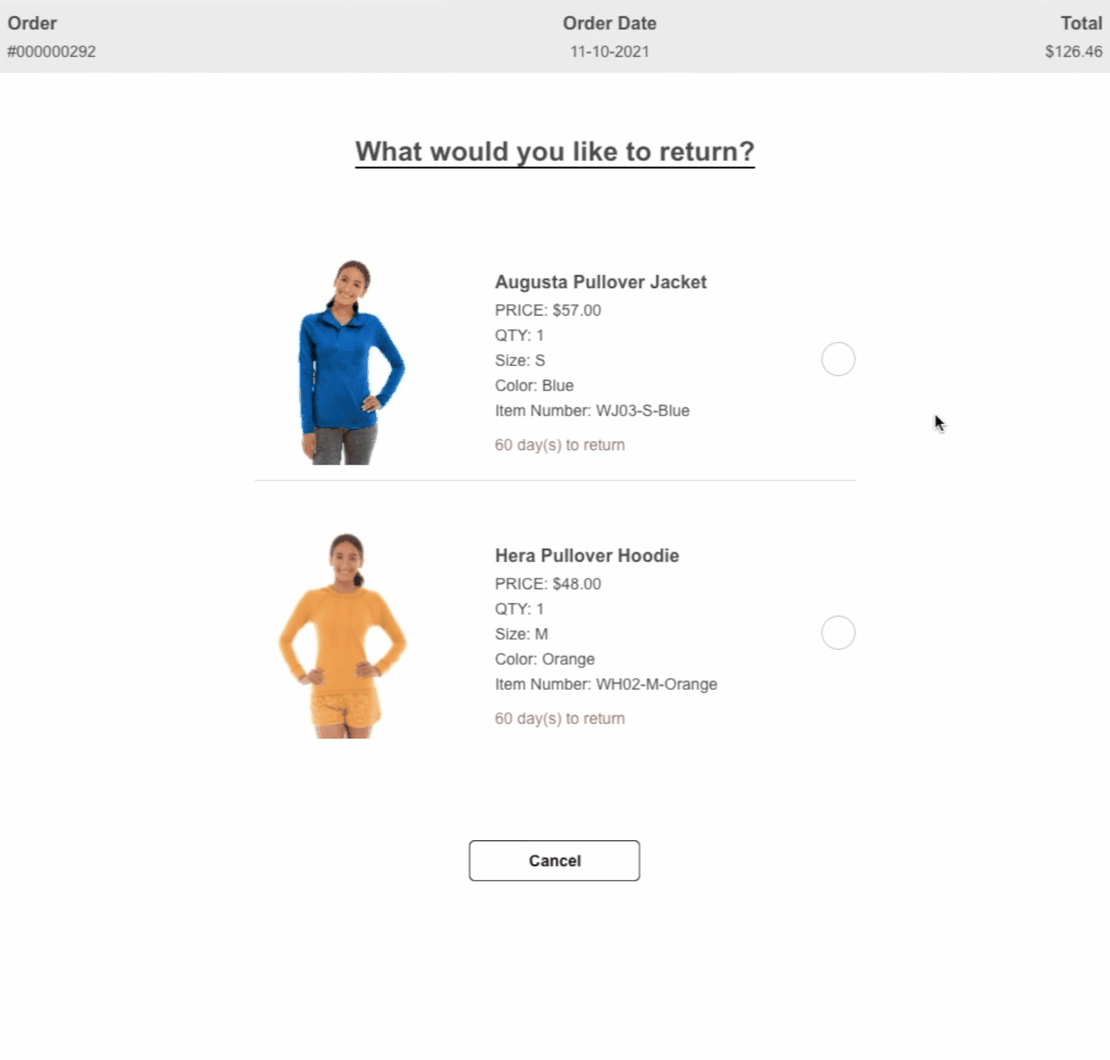
Moreover, if you’re using a returns system like WeSupply, you’ll also be able to better track your refunds— especially since international returns and refunds add a couple of extra steps to the whole process. So what happens when a customer marks 3 items for return but only sends back 2 of them? In this case, it can be challenging to keep track of what was received and how much money the customer should be refunded.
To solve this, refund each and every item separately as soon as you receive them. This is why features like partial refunds help keep your warehouse organized and ensure that everyone is happy with the return process!
You know what they say, you can’t have it all, right?
Actually, you can! All you need to do is to choose the returns management solution that fits your needs.
Do you need complete automation throughout the process? Is self-service on your radar to improve the customer experience? Are you providing refunds and exchanges? Make a list of all the features and options you need from your RMA platform and make your decision carefully. With the right combination, you can unlock the true potential of your returns center!
Here are our recommendations for a comprehensive and cost-effective solution:
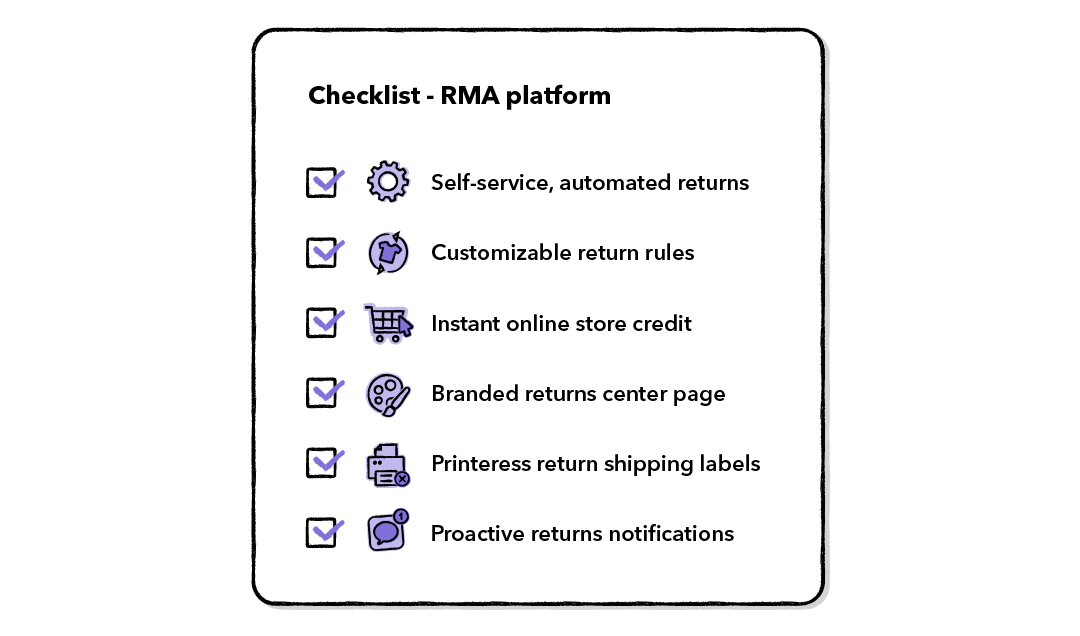
In the end, what matters is to create a memorable, positive experience for your international customers, crossing the barriers and limitations imposed by international returns.
If customer retention is one of the areas you want to work on, you have to consider how your customers are feeling about the return process. Keep in mind statistics such as the fact that 84% of consumers expect online retailers to provide free returns, whereas 79% of them simply won’t proceed with a purchase from an online store that charges return shipping fees. This can help you weigh in your options and decide what you can offer without putting a strain on your business finances.
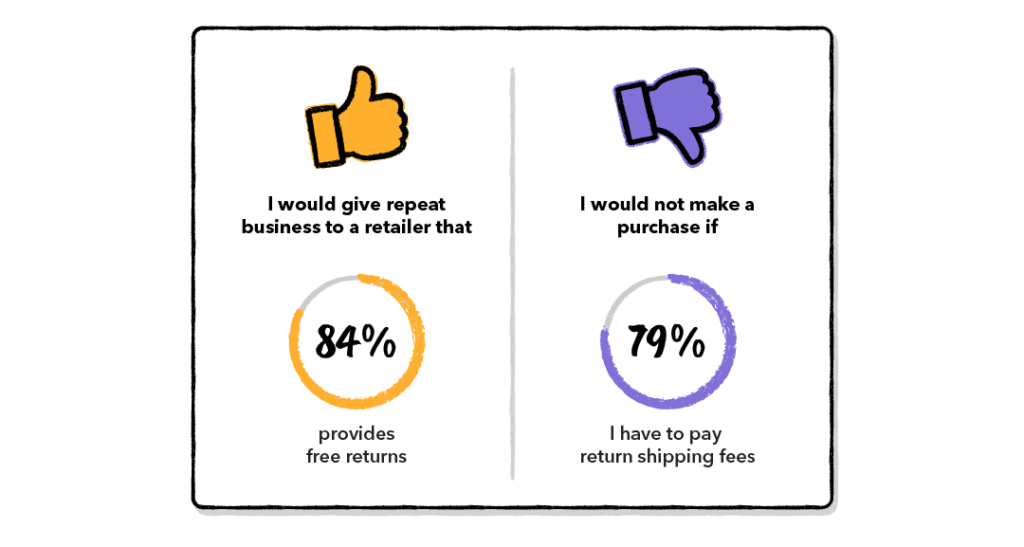
Increasingly tech-savvy and hurried consumers are naturally demanding returns to be processed at a higher speed, with more flexibility and convenience. In order to meet their expectations, your returns service should be just as effective as the delivery. If you’re failing to rise to their standards, you’ll have to deal with cart abandonment, reduced customer lifetime value, or missed opportunities.
The increased customer demand during the peak holiday season can be challenging to meet, particularly when it comes to online purchases and returns. Many customers are looking at extended policies that cover their needs in case they need to exchange a product or replace a gift. Now, this is particularly important when working with international sales and returns. You don’t want to lose your international customer base for something that can be avoided altogether.
It’s simply better to listen to your customers and provide an extended return policy around the holiday season if that works for them. To show customers how much they matter and how much you appreciate their loyalty, it’s important to make sure every step in the process goes smoothly from start to finish!
Store credit is a powerful tool that can help boost retention and inspire brand loyalty, as well as increase spending by offering an incentive to purchase again from your eCommerce website. When it comes to international returns. this is even more profitable for you and convenient for the customer! Instead of waiting for days or weeks to receive their money back into their bank account, lose from the initial amount due to currency exchanges, and so on, they’ll receive instant credit coupons they can use on your website right away.
Refund requests can be handled in different ways to encourage long-term customer loyalty without actually refunding the money. The key is turning refunds into repurchases and increasing repeat business, which will increase your sales per customer over time as well— and this is exactly what instant store credit does.
Increasingly tech-savvy and hurried consumers are naturally demanding returns to be processed at a higher speed, with more flexibility and convenience. In order to meet their expectations, your returns service should be just as effective as the delivery. If you’re failing to rise to their standards, you’ll have to deal with cart abandonment, reduced customer lifetime value, or missed opportunities.
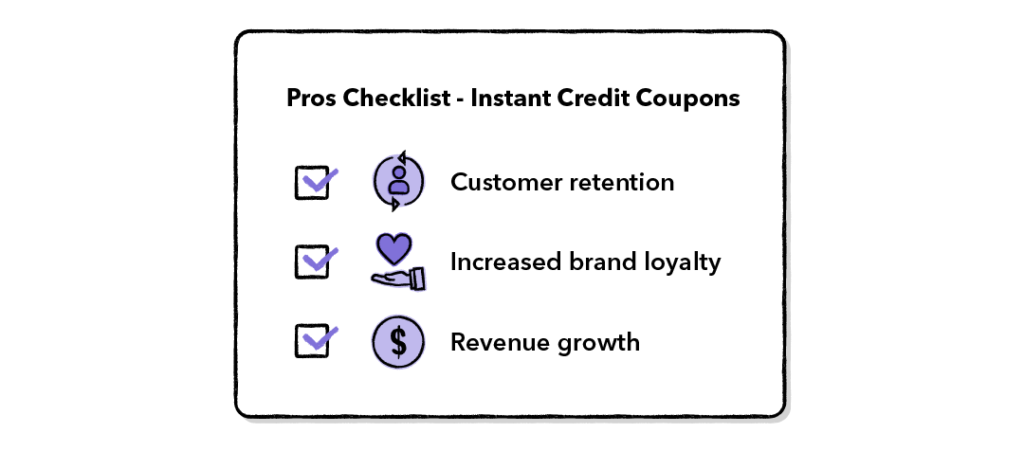
The numbers show that retail eCommerce has nearly doubled since the coronavirus pandemic started. In 2022, US eCommerce sales are expected to surpass $1 trillion for the first time ever. Although this is great in terms of sales, you also need to take into consideration that over 30% of all products ordered online are returned, compared to the 8.89% in brick-and-mortar stores.

Moreover, the current supply chain strain is causing an increase in shipping costs. In fact, the average cost to handle a returned item is up 59% from 2020 (source). The return costs are often covered by retailers, putting additional pressure on their businesses. Offering free return shipping is a great way to increase customer retention and improve the overall customer experience, but it can also take a toll on your online store if not handled properly and as cost-effectively as possible.

One way to manage international returns effectively is to centralize all returns, including unsuccessful ones. This will give you an overview of what works and what doesn’t, enabling you to determine which areas need improvement. Your lack of control and comprehensive knowledge of your international returns will put your business at risk. Does the last mile carrier or the local courier need some more work? Are you losing lots of data from the last mile carrier tracking? Do you have enough shipping options? These are some of the questions you should be asking yourself in order to improve the entire returns process for your international customers.
If you’re looking for an all-in-one, one-stop platform for managing your returns, you’re in luck: we’ve got exactly what you need. Our eCommerce Returns Self-Service Center is the perfect solution for eCommerce businesses and online retailers, regardless of their location or where they’re shipping their products!
You can centralize all returns by supplier, location, item, or other criteria to fully customize your services and return policy and create the best post-purchase experience ever. Remember that the sale no longer ends with the sale— you’ll need much more in today’s competitive business climate to win over your customer base and earn their trust long-term, and that’s why we’re here to help.
Learn how automated returns
work in WeSupply!
Our shipping and logistics experts will guide you through the product and analyze how WeSupply best fits your eCommerce needs.
Want more details about curbside pickup in retail?
Download this guide to learn everything you need to know about BOPAC!

Handling dropshipping returns can be challenging. In this article, we’ll discuss the most common return mistakes and how to deal with them!
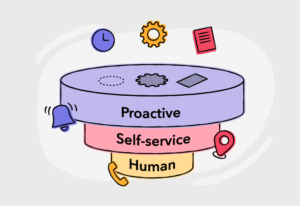
You’ve worked hard to create a positive and memorable online shopping experience for your customers, and now you have the opportunity to deliver your products right into their hands! But what can you do when something unexpected happens during the shipping process?

Learn about self-service returns and how you can effectively implement a self-service returns center for eCommerce business success!
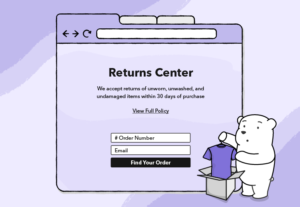
The 8 steps you need to take for a killer return center page that will help you improve the customer experience and reduce return costs!
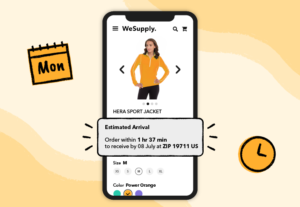
Learn how calculating shipping dates will help you improve customer experience long-term and ultimately boost sales!

Check out this article for 5 tips to help you keep up with the increased customer demand during the holiday season.
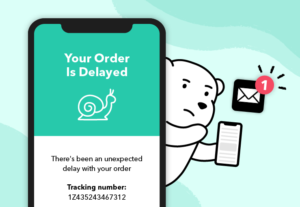
You’ve worked hard to create a positive and memorable online shopping experience for your customers, and now you have the opportunity to deliver your products right into their hands! But what can you do when something unexpected happens during the shipping process?

Customers want to know once their order has been shipped, especially considering the current supply chain situation. Knowing whether or not their order is on the way helps to ease their mind, increasing their satisfaction and the likelihood of purchasing again from your eCommerce website!

What is Post Purchase Behavior, & Why Should You Care? Are you leaving money on the table by ignoring the post purchase behavior of your